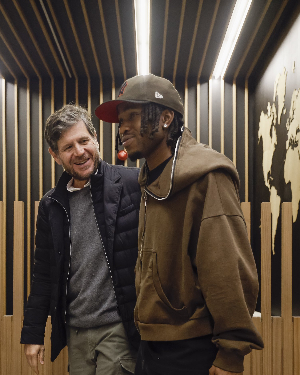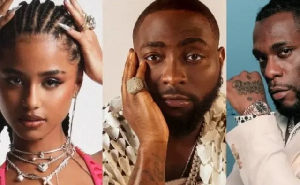Editorial News of Monday, 14 June 2021
Source: face2faceafrica.com
How Buhari abducted an ex-minister in London and stuffed him inside a container heading for Lagos
Umaru Dikko was Minister of Transport in Shehu Shagari's civilian government from 1979 to the end of 1983 until the country's army ousted it and installed Maj. Gen. Muhammadu Buhari as president. The new military government imprisoned a number of government ministers in Shagari's government for corruption.
Dikko, an opponent of Buhari's military dictatorship, reportedly disguised himself as a priest and fled to London.
While in London, he remained a vocal opponent of the military regime, which accused him of corruption and stealing millions of dollars from a rice distribution scheme he oversaw.
Dikko vehemently refuted the allegations. Despite this, the military administration declared him "Nigeria's most sought man" and developed a scheme to kidnap him from the streets of London and return him to Nigeria for prosecution.
According to the Independent, Dikko was tracked to a house in West London by Nigerian intelligence agencies and undercover agents (together with other Israelis suspected of being members of Israel's intelligence agency, Mossad). The former minister's home was under surveillance by a joint Nigerian-Israeli squad, according to Face2Face Africa.
Alexander Barak, an accused former Mossad agent from Israel, is said to have directed the kidnapping team, which also comprised Maj Mohammed Yusufu, a Nigerian intelligence official, and Israeli nationals Felix Abitbol and Dr. Lev-Arie Shapiro. Dikko was to be given anesthesia by one of the team members.
He was kidnapped outside his London house on July 5, 1984, and stuffed into the back of a vehicle with a huge container addressed to the Nigerian Ministry of External Affairs in Lagos, the country's capital at the time.
The kidnappers gave Dikko an injection before placing him in the crate, unconscious, with an Israeli anesthetist by his side to keep him breathing. A second box held Barak and Abitbol. Both boxes had been sealed. The kidnappers transported Dikko to Stansted Airport, where he was loaded into a Nigerian cargo jet bound for Lagos.
Dikko's secretary had observed the kidnapping, which the kidnappers were unaware of. She dialed the police number. Following this, the British government instructed customs personnel at airports, ports, and border crossings to scrutinize Nigeria-bound vessels with extra caution, according to Face2Face Africa.
After hearing of the kidnapping, Charles David Morrow, a young customs officer at Stansted, ordered the containers to be opened just as the Nigerian cargo jet was about to take off.
“Until about 3 p.m., the day had gone quite routinely. The handling agents then came through and said there was goods due to be delivered on a Nigerian Airways 707, but the folks delivering it didn't want it manifested,” Morrow told the BBC.
“I walked downstairs to check who they were and what was going on,” says the narrator. Mr Edet, a Nigerian diplomat, was one of the people I met. When he showed me his passport, he explained that it was for diplomatic cargo. I asked what it was because I was unfamiliar with such stuff, and he said it was simply records and things.”
Morrow said Nigerian intelligence officials and diplomatic staff argued that the crates could not be opened as they were protected by diplomatic immunity.
Morrow knew that any cargo designated as a diplomatic bag is protected by the Vienna Convention from being opened by customs officers. Thus, he got on the phone to the British Foreign Office.”
To be considered a "diplomatic bag," they had to be properly labeled with the words "Diplomatic Bag" and carried by an accredited courier with the necessary documents. He stated, "It was reasonable to assume they had a Nigerian diplomat – I'd seen his passport – but they didn't have the proper documentation, and they weren't tagged 'Diplomatic Bag.'"
The final decision was that the crates could be opened. Customs officers called anti-terrorist police, cordoned off the area and evacuated airport staff. They then opened the crate in the presence of the police. They found Dikko unconscious inside one of the crates. Next to him was the doctor who had injected him.
“He [Dikko] had no shirt on, he had a heart monitor on him, and he had a tube in his throat to keep his airway open. No shoes and socks and handcuffs around his ankles. The Israeli anesthetist was in there, clearly to keep him alive,” recalled Morrow.
Customs officials found the other kidnappers in the other crate. “I remember the very violent way in which I was grabbed and hurled into a van, with a huge fellow sitting on my head – and the way in which they immediately put on me handcuffs and chains on my legs,” Dikko told the BBC a year after the incident.
At the end of the day, the Nigerian intelligence officer and the three Israelis were all convicted of the crime and sent to prison. The governments of Nigeria and Israel however denied involvement in the crime. The incident marred relations between Britain and Nigeria for two years.
In 2012, historian Max Siollun wrote in The Independent of London, "The kidnapping triggered one of the worst-ever diplomatic crises between Britain and Nigeria." “In London, the Nigerian high commissioner was proclaimed persona non grata, and the CEO of Nigeria Airways narrowly escaped arrest by British authorities. Nigerian-British diplomatic connections were suspended for two years.”
A decade after the tragedy, Dikko returned to Nigeria. On July 1, he died in London, leaving behind "two wives, eleven children, and many grandchildren."
Dikko was born in 1936 in Wamba, Nigeria's central region, and had previously studied at the University of London and worked for the BBC. He went on to become a commissioner in Nigeria's northern region (now Kaduna State) and the campaign manager for his brother-in-law Shagari's presidential candidacy.
He attended to law school in London after his kidnapping and was admitted to the bar. He returned to Nigerian politics in the 1990s, and just before his death, he was named head of the People's Democratic Party's disciplinary committee, which is chaired by President Goodluck Jonathan.












